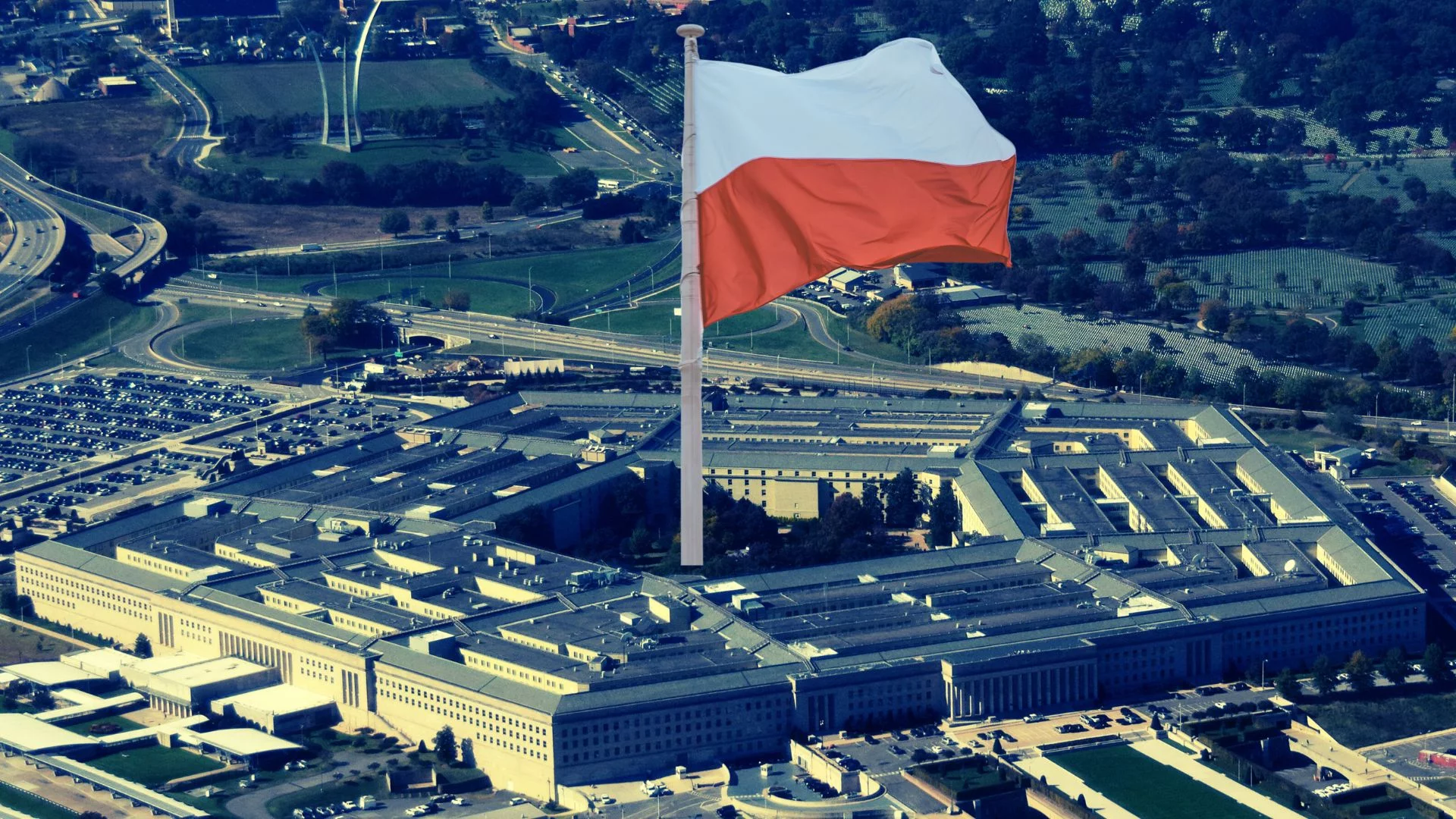
Iranian Parliament Backs Strait Of Hormuz Closure, Oil Market Braces For Turmoil
Iranian state-owned outlet Press TV has released a new report quoting Major General Kowsari, a senior member of the Iranian Parliament’s National Security Commission, who stated:
„The Parliament has reached the conclusion that the Strait of Hormuz should be closed, but the final decision in this regard lies with the Supreme National Security Council.”
Major General Kowsari, member of the National Security Commission of the Parliament: The Parliament has reached the conclusion that the Strait of Hormuz should be closed, but the final decision in this regard lies with the Supreme National Security Council. pic.twitter.com/sWd0rsOBsA
— Press TV Breaking (@PTVBreaking1) June 22, 2025
If Ayatollah Ali Khamenei approves the proposed closure of the critical maritime chokepoint—through which approximately 30% of global seaborne oil and 20% of LNG transit—Brent crude and natural gas futures will surge sharply this evening.
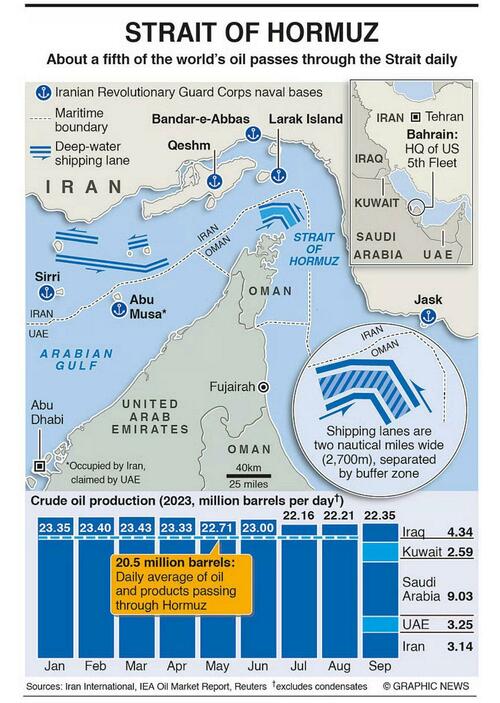
Reuters earlier cited lawmaker and Revolutionary Guards Commander Esmail Kosari, who told Young Journalist Club that closing the critical maritime checkpoint is on the agenda and „will be done whenever necessary.”
And this.
’We can close the strait of Hormuz and shut their mouths. This will ruin their economy’
Young Iranians dismiss Trump attacks, sharing thoughts on bombings to Fars News
'We should hit Dimona 10 times harder’ pic.twitter.com/fZRyaVm1wG
— RT (@RT_com) June 22, 2025
Crypto-based prediction market Polymarket shows that odds for a „Strait of Hormuz closure by July” surged from roughly 15% before the U.S. B-2 stealth bomber strikes on Iran’s key nuclear sites—Fordow, Natanz, and Esfahan—to as high as 60% earlier today, reflecting a sharp repricing of geopolitical risk.
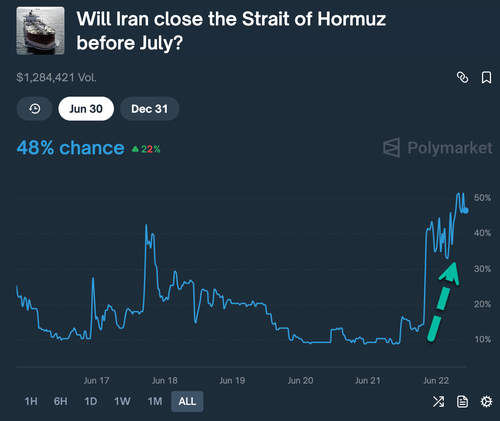
The potential closure of the strait was recently outlined in a „worst-case scenario” by JPMorgan’s chief commodity strategist, Natasha Kaneva (available to pro subscribers in the usual place). The note cautioned that a severe outcome could send oil prices into the $120-$130 per barrel range.
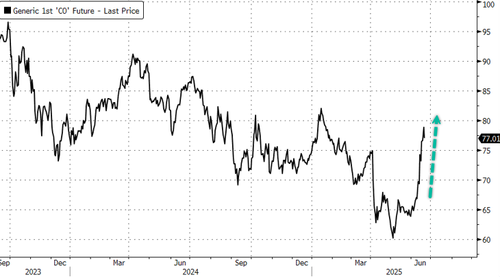
London-based oil strategist at Bloomberg, Julian Lee, penned several important questions about what would happen if Iran tried to close the critical maritime chokepoint:
Could Iran really block the Strait of Hormuz?
Iran would have no legal authority to order a halt to traffic through Hormuz, so would need to achieve this by force or the threat of force.
If its navy tried to bar entry to the strait, it would likely be met with a strong response from the U.S. Fifth Fleet and other Western navies patrolling the area.
But it could cause severe disruption without a single Iranian warship leaving port. One option would be to harry shipping with small, fast patrol boats. Or it could launch drones and fire missiles toward ships from coastal or inland sites. That could make it too risky for commercial ships to venture through.
Similar tactics have been employed successfully by the Houthi militia in Yemen to disrupt traffic through the Bab el-Mandeb strait leading into the Red Sea on the other side of the Arabian peninsula. The Houthis have mostly fired missiles and drones at ships after warning owners of vessels linked to the U.S., the UK and Israel that they will be attacked if they approach the area.
A US-led force in the Red Sea is seeking to protect shipping there. But the number of ships sailing through the Red Sea and Gulf of Aden was still down about 70% in June compared with the average level of 2022 and 2023, according to Clarkson Research Services Ltd, a unit of the world’s largest shipbroker. This has forced vessel operators to reroute their traffic around the southern tip of Africa instead of going through the Suez Canal — a lengthier and more expensive journey for ships traveling between Asia and Europe.
Closing the Strait of Hormuz would quickly hit Iran’s own economy as it would prevent it from exporting its petroleum. And it would antagonize China, the biggest buyer of Iranian oil and a critical partner that’s used its veto power at the UN Security Council to shield Iran from Western-led sanctions or resolutions.
When has Iran disrupted shipping?
Iran has used harassment of ships in the Gulf for decades to register its dissatisfaction with sanctions against it, or as leverage in disputes.
- In April 2024, hours before launching a drone and missile attack on Israel, Iran’s Islamic Revolutionary Guard Corps seized an Israel-linked container ship near the Strait of Hormuz. Iran released the ship’s crew the following month, according to trade publication Lloyd’s List. Tehran claimed that the MSC Aries had violated maritime regulations, but analysts pointed to its Israeli ownership connection as a motive.
- When it seized a US-bound tanker in April 2023, Iran said the ship had struck another vessel. But the move appeared to be retaliation for the seizure off Malaysia’s coast of a ship loaded with Iranian crude by U.S. authorities on the grounds of sanctions violations.
- In May 2022, Iran seized two Greek tankers and held them for six months, presumably a response to the confiscation by Greek and U.S. authorities of Iranian oil on a different ship. The cargo was eventually released and the Greek tankers freed. So, too, was the oil on a tanker that Iran said it impounded in January „in retaliation for the theft of oil by the US.”
Has Iran ever closed the Strait of Hormuz?
Not so far. During the 1980-88 war between Iraq and Iran, Iraqi forces attacked an oil export terminal at Kharg Island, northwest of the strait, in part to provoke an Iranian retaliation that would draw the U.S. into the conflict. Afterward, in what was called the Tanker War, the two sides attacked 451 vessels between them. That significantly raised the cost of insuring tankers and helped push up oil prices. When sanctions were imposed on Iran in 2011, it threatened to close the strait, but ultimately backed off.
Commodore Alireza Tangsiri, head of Iran’s Islamic Revolutionary Guard Corps naval forces, said shortly before the MSC Aries seizure that Iran has the option of disrupting traffic through the Strait of Hormuz, but chooses not to.
How did the U.S. and allies respond to threats to Hormuz shipping in the past?
During the Tanker War, the U.S. Navy resorted to escorting vessels through the Gulf. In 2019, it dispatched an aircraft carrier and B-52 bombers to the region. The same year, the U.S. started Operation Sentinel in response to Iran’s disruption of shipping. Ten other nations — including the UK, Saudi Arabia, the United Arab Emirates, and Bahrain — later joined the operation, known now as the International Maritime Security Construct. Since late 2023, much of the focus on protecting shipping has switched away from the Strait of Hormuz and onto the southern Red Sea, the region’s other vital waterway, and the Bab el-Mandeb Strait that connects it to the Gulf of Aden and the Indian Ocean. Attacks by the Iran-backed Houthis on shipping entering or exiting the Red Sea became a greater concern than the Strait of Hormuz.
UK-flagged tanker Kohzan Maru reversed course in the Strait of Hormuz overnight after the strikes became public.
At least one tanker in the Strait of Hormuz appears to have paused its transit after the US struck Iran overnight.
Seen here, the UK-flagged tanker Kohzan Maru reversed course after the strikes became public and is now racing south at top speed. pic.twitter.com/xugD83AoEZ
— OSINTtechnical (@Osinttechnical) June 22, 2025
Latest ship tracking data via Bloomberg shows tankers are still flowing through the maritime chokepoint.
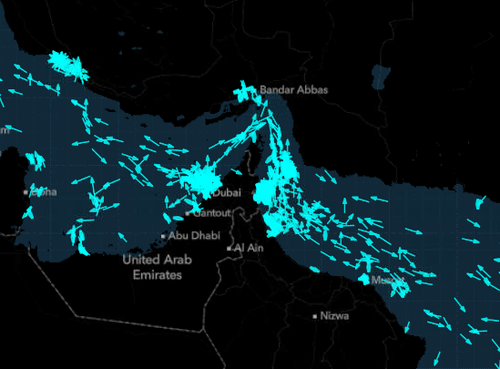
Other critical maritime chokepoints to keep an eye on in the region.
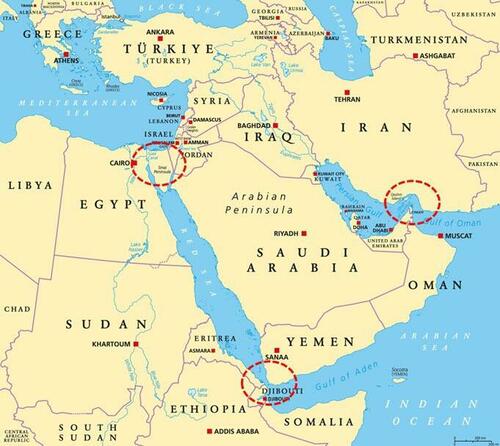
U.S. Secretary of State Marco Rubio issued this warning to Iran on Fox News: „If Iran closes the Strait of Hormuz, it will be another terrible mistake. It’s economic suicide for them if they do it and we retain options to deal with that.”
Rubio:
“If Iran closes the Strait of Hormuz, it will be another terrible mistake. It’s economic suicide for them if they do it and we retain options to deal with that” pic.twitter.com/6mXeYXJ6Te
— Visegrád 24 (@visegrad24) June 22, 2025
Now the West waits for Iran’s retaliatory attack.
Tyler Durden
Sun, 06/22/2025 – 11:05




